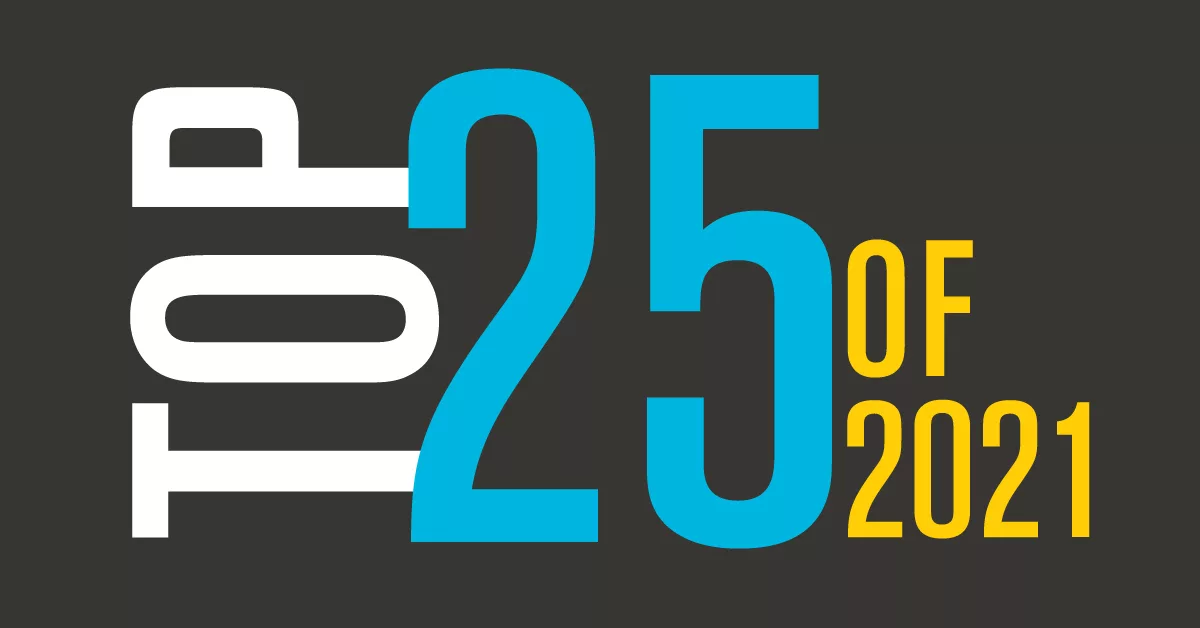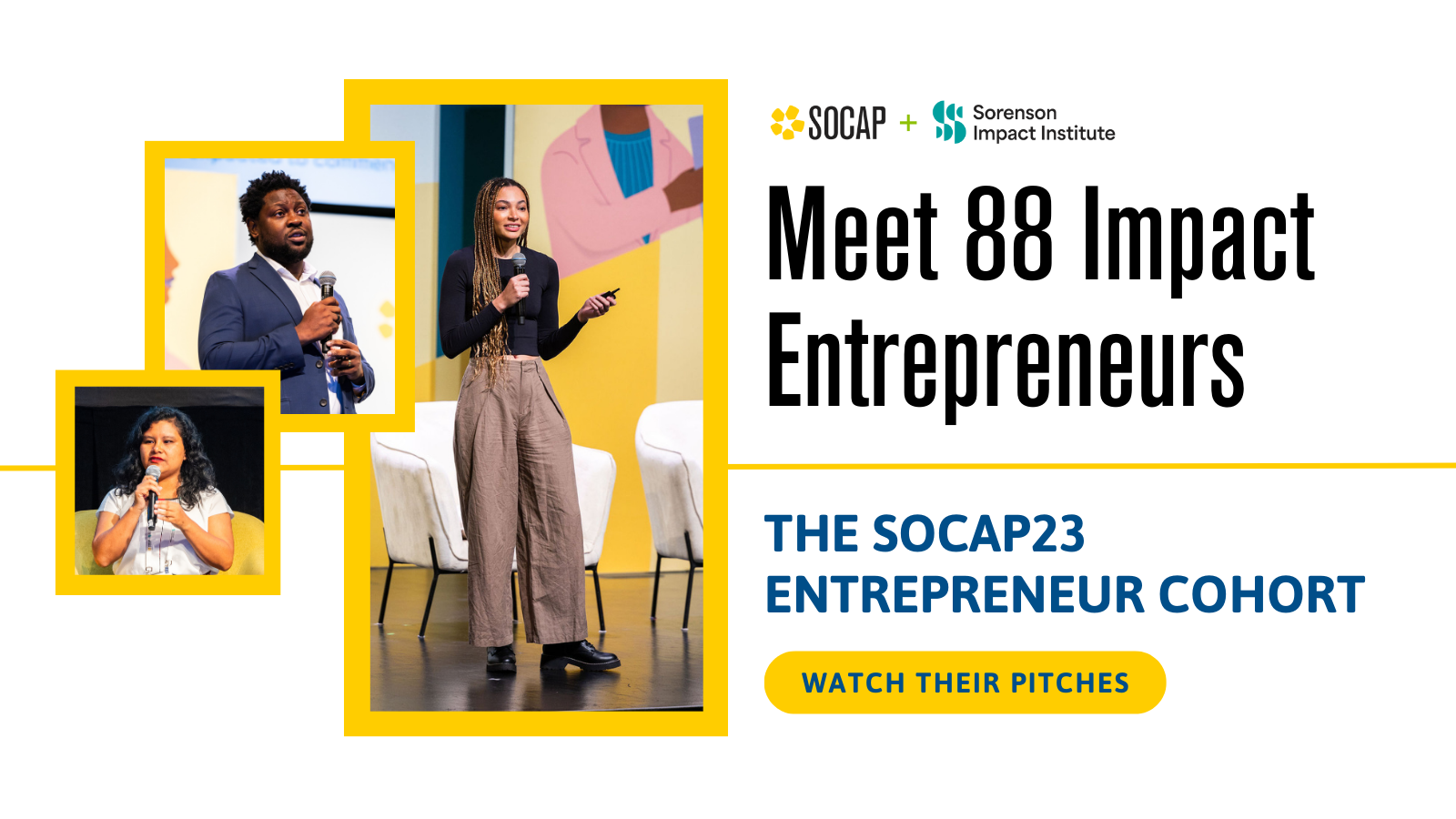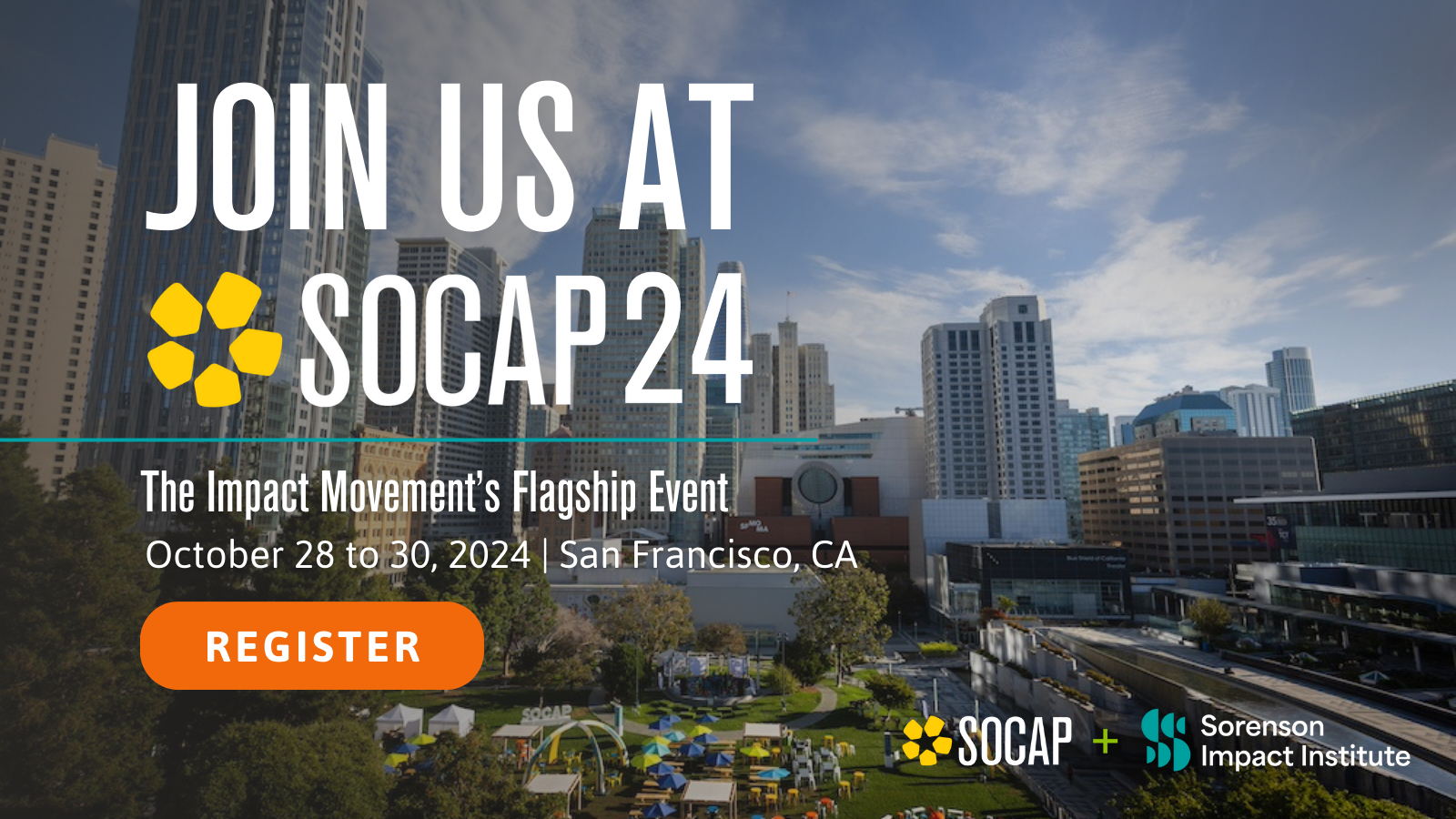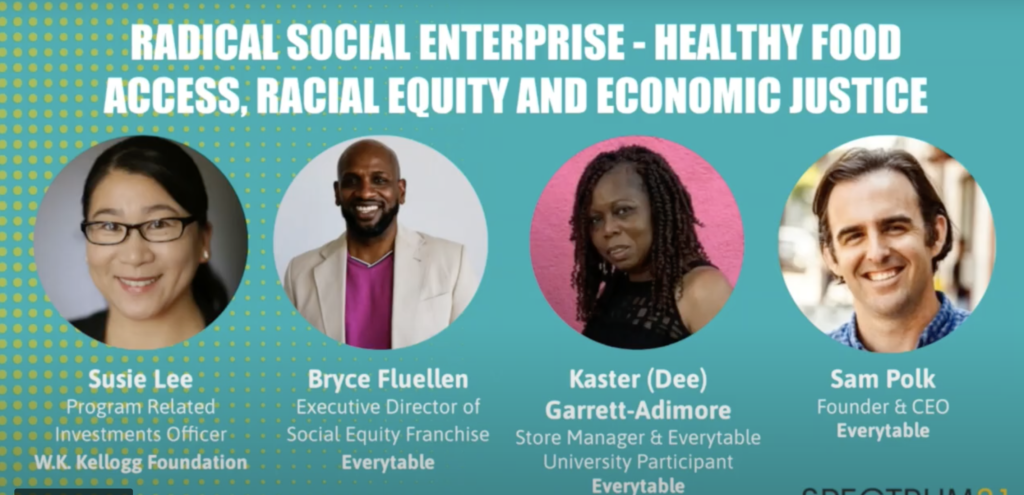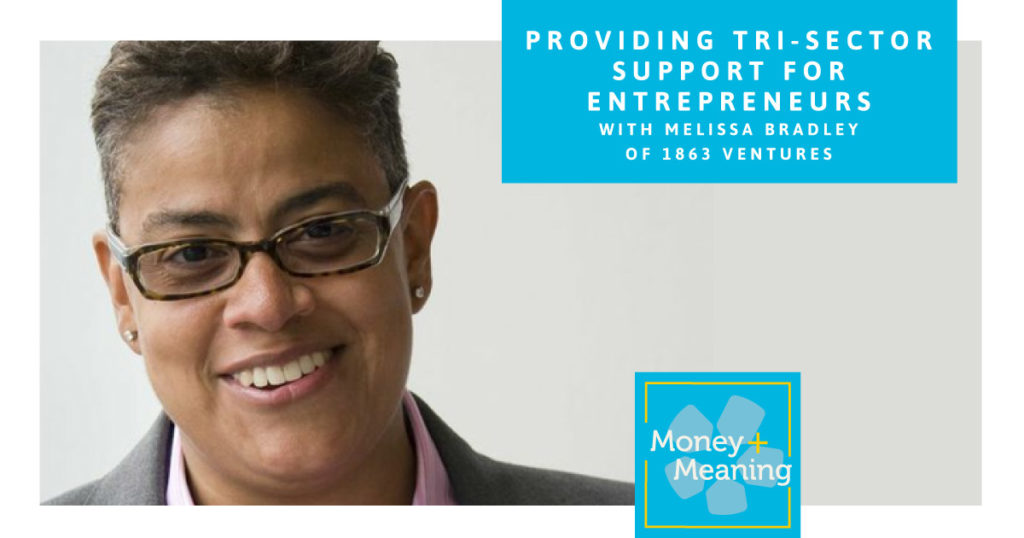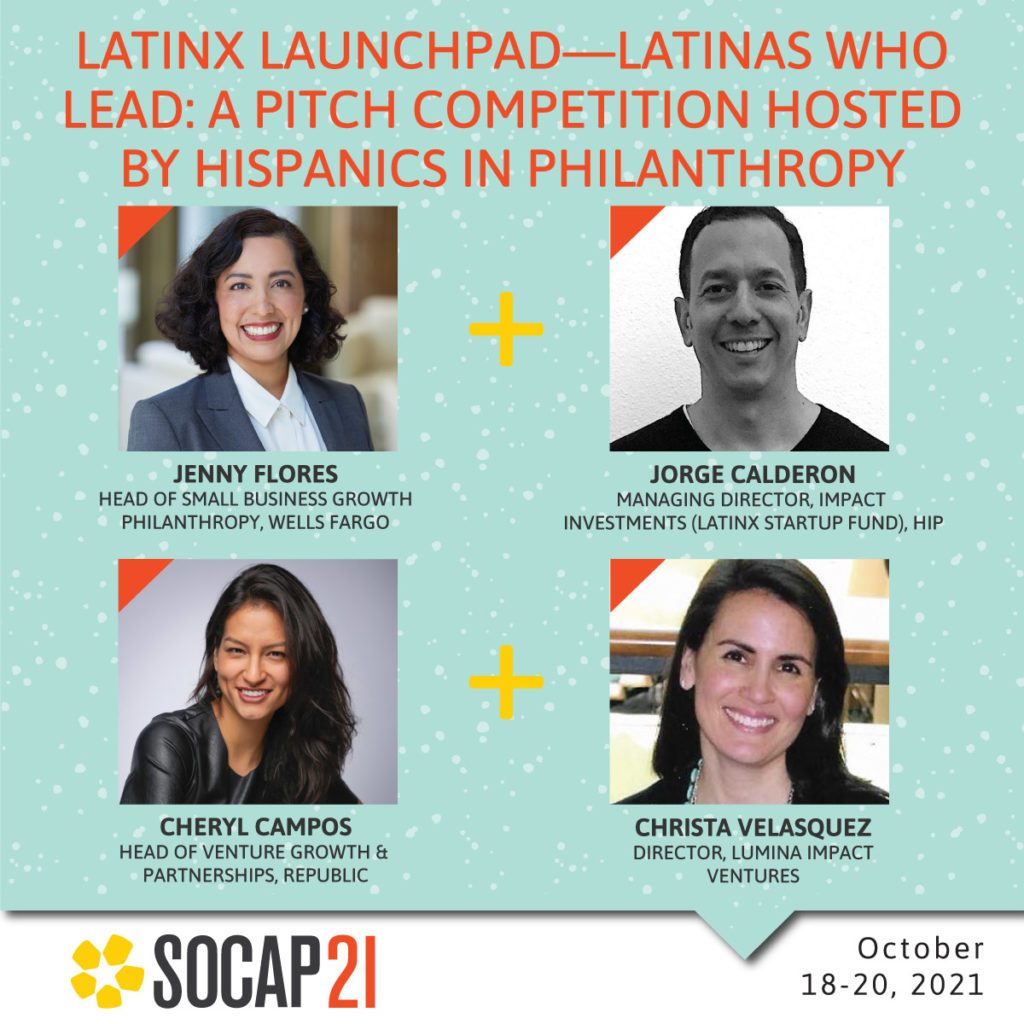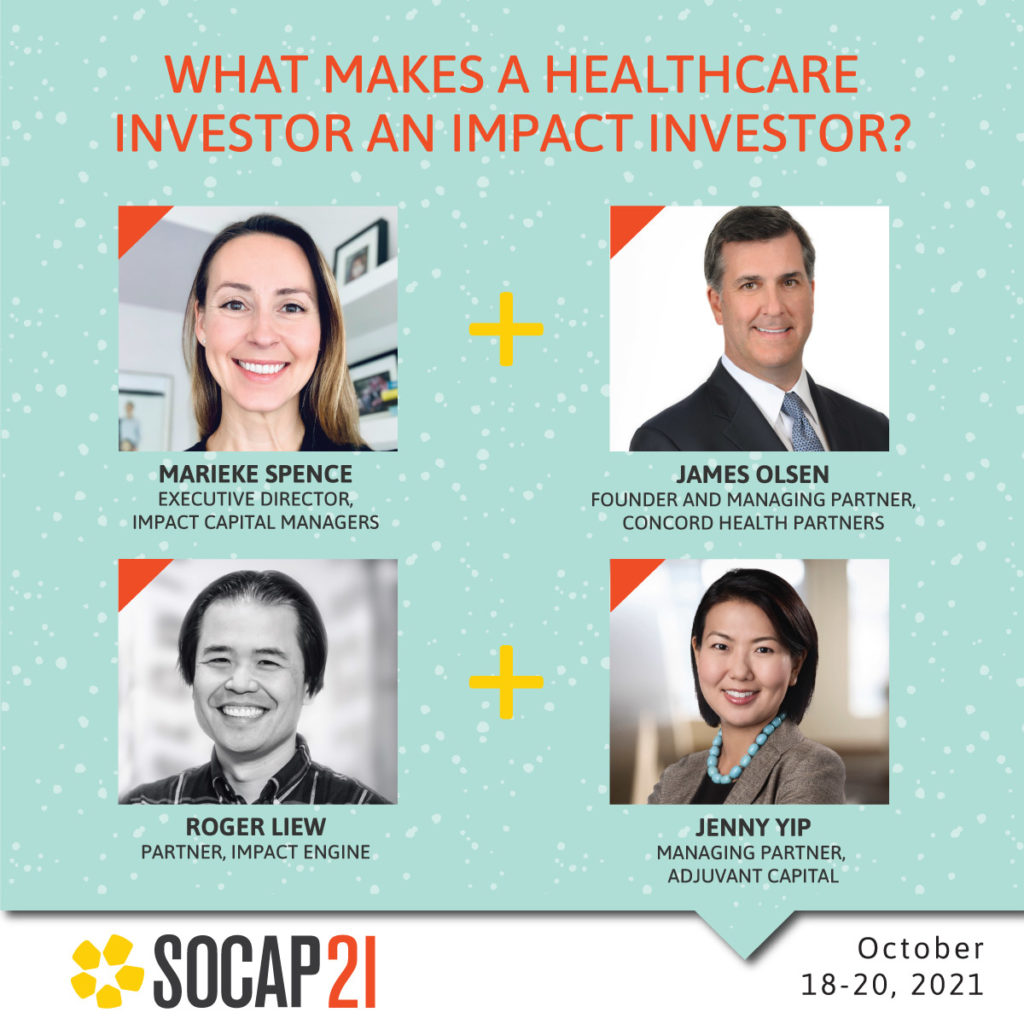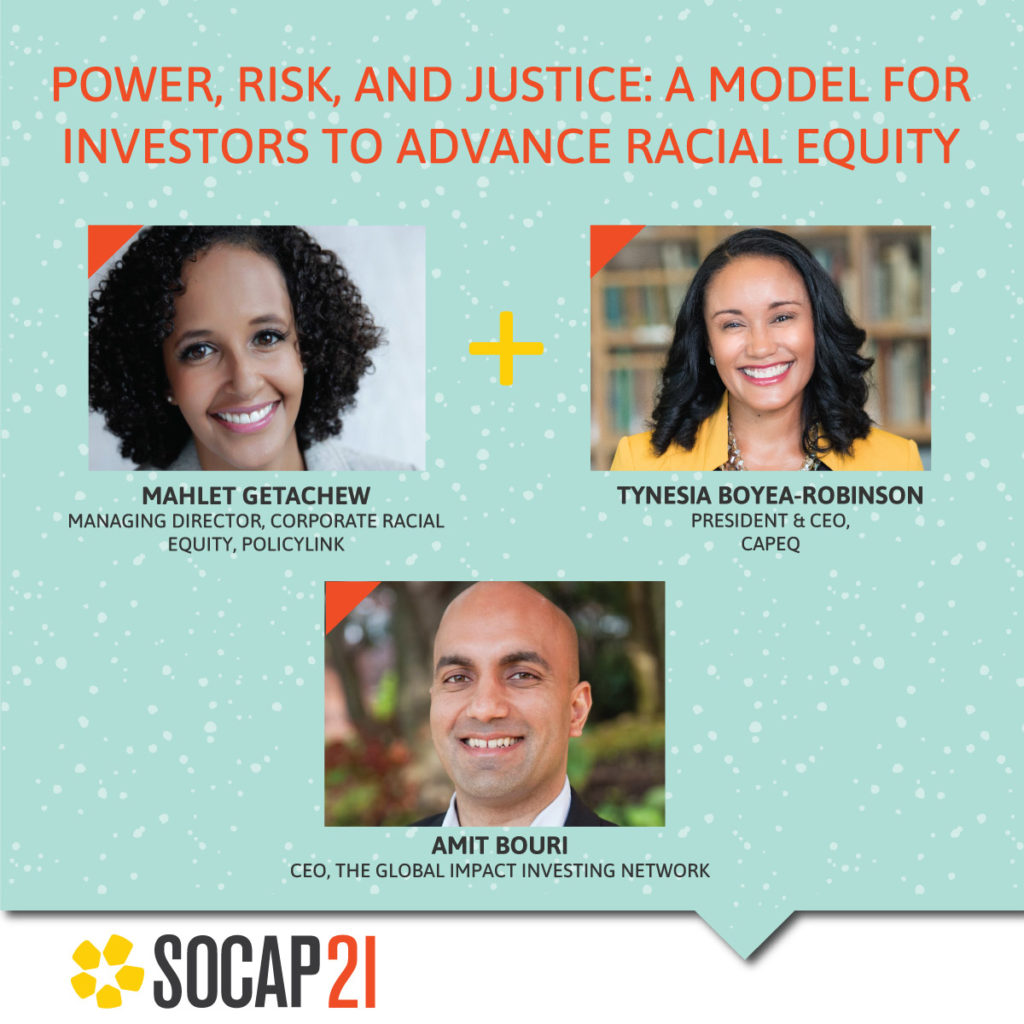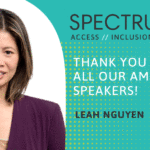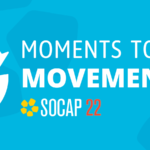Inclusion, Climate Justice, and How the Impact Investing Community Can Make Meaningful Progress
Driven by the global pandemic and social and racial justice movements, 2020 and 2021 brought surges in impact investing and interest in the impact economy. We saw an acceleration and amplification of many of the challenges facing our society, which led to a push for more purposeful investments, primarily driven by younger generations and women. The past two years have also forced many of us to slow down in our personal lives, providing a moment to reflect, reimagine, and redesign what a just and inclusive future looks like.
How are the SOCAP community and impact industry radically collaborating to rise to the massive challenges facing societies? And how are we holding ourselves and each other accountable to contribute to the future we all aspire to? And are we making progress to that end?
The challenges facing our society are complex; they are intersectional and none of them exist in a vacuum. None of the challenges can be solved without bringing everyone to the table, and we must continue to intentionally design SOCAP and the entire field to include more voices and more perspectives in each and every conversation. Racial equity and representative voice for all; artists and culture-makers; critical action on climate: all are critical to helping open up, surface, and create durable solutions. These solutions will require cross-sectoral innovation from around the globe, whether revolutionary or more evolutionary.
Here, we share the conversations, ideas, lessons, and challenges from across our virtual event series that are sticking with us into the coming year (and beyond). We want to hear from you, too: What is sticking with you from 2021 as a goal we can work collectively to achieve? How are you rethinking and reimagining a more inclusive future? Share with the community and find collaborators in SOCAP Assembly — a free platform designed for connection and impact for the SOCAP Community.
Find more ideas and get inspired to take action below!

SPECTRUM21: Access, Inclusion, Action
Investing in Impact and Opportunity: Cleveland Avenue and the MacArthur Foundation
John Palfrey, President of the John D. and Catherine T. MacArthur Foundation, joins in conversation with Don and Liz Thompson, founders of Cleveland Avenue and the Cleveland Avenue Foundation for Education Group about advancing racial equity, education, and economic opportunity. MacArthur and the Thompsons are partnering through impact investing in the CAST US fund to help accelerate the success of diverse entrepreneurs in the Chicago region.
With a goal of making “exclusive groups more inclusive,” the Cleveland Avenue venture fund and accelerator is investing in a specific group of actors — purpose-driven entrepreneurs in historically underserved Chicago neighborhoods — and providing support and access critical to their success. As Co-Founder Don Thompson said during this SPECTRUM21 session, Cleveland Avenue and the John D. and Catherine T. MacArthur Foundation are creating this investment model with the hope that it can be replicated in other cities — amplifying positive impact through the $70 million CAST US fund designated for “new talent.”
Equitable Recovery: 5 Ways to Invest in BIPOC-Owned Companies in 2021
Addressing racial inequality in our economy must include investments in BIPOC-owned businesses. By empowering founders and business owners of color with the monetary tools needed for success, impact investors can help advance racial justice and create more financial resiliency within these communities. At SPECTRUM21 Virtual, Aaron Walker, Founder & CEO of Camelback Ventures discussed the most effective ways to invest in BIPOC-owned companies in 2021. Camelback Ventures, supports entrepreneurs of color and women entrepreneurs with investments, guidance, and network connections. Walker said what motivated him to found the company was the opportunity gap these entrepreneurs face.
“I do what I do because genius is equally distributed but opportunity is not.”
— Aaron Walker
Fueling the South’s Small Businesses as Key Drivers of an Equitable Recovery
Businesses in the South have been historically underfunded and underbanked by almost every metric, so it was unsurprising they received a disproportionately low percentage of federal support in the wake of the pandemic. In response, a cross-sector coalition of philanthropic, private, and corporate investors has partnered with local small business community lenders to launch the Southern Opportunity And Resilience (SOAR) Fund.
With more than $50 million in initial commitments, the fund will provide low-interest loans and free business support to the smallest of small businesses across the south — most with fewer than 10 employees. In this SPECTRUM21 discussion, several partners in the fund’s launch discussed the role of community lenders and investors in supporting traditionally underinvested communities and their learnings from the launch of this first-of-its-kind fund. This conversation includes Beth Bafford, VP, Syndications & Strategy at Calvert Impact Capital; Paul Quintero, President & CEO of Ascendus; James Bason, President & CEO of TruFund; and Sarah Beth Gehl, Research Director at The Southern Economic Advancement Project (SEAP).
SPECTRUM21: The Color of Money
Radical Social Enterprise: Healthy Food Access, Racial Equity and Economic Justice
Women and entrepreneurs of color have the talent, acumen, and lived experience to be lucrative business owners. However, the lack of equitable investment capital often hinders their ability to thrive. In addition, small business owners of color were disproportionately impacted by COVID-19 and suffered the most loss.
Everytable, a mission-driven food company, is tackling the racial wealth gap by shoring up financial support for budding entrepreneurs through its radical social equity franchise model and addressing inequitable access to healthy food, one of several outcomes of systemic racism. This conversation includes Susie Lee, Program Related Investments Officer at W.K. Kellogg Foundation; Bryce Fluellen, Executive Director of Social Equity Franchise at Everytable; Sam Polk, Founder and CEO at Everytable; and Kaster (Dee) Garrett-Adimora, Store Manager at Everytable & Everytable University Participant.
SPECTRUM21: I’m Speaking
Navigating Boss Status and Our New Normal
The pandemic hasn’t stopped women from continuing to take the lead as bosses across all sectors—from boardrooms to the White House—while juggling all the things that come with being a powerhouse in today’s society. At the same time, however, women lost 64 million jobs and $800 billion in earnings due to the pandemic.
In this session, women leaders discuss the challenges they have faced during COVID (and beyond), gender equity in the economy, and being bosses themselves. Watch the session to hear from Christine St. Vil, Founder of Social Scoop; Allie Burns, CEO of Village Capital; and Leticia Peguero, Vice President of Programs at The Nathan Cummings Foundation.
Money and Meaning Podcasts
The Economic Imperative to Support Marginalized Entrepreneurs
In this podcast episode, Melissa Bradley of 1863 Ventures talks about how the entrepreneurial ecosystem has grown and evolved over the years and the biggest areas of need moving forward. She also discusses where certain sectors are best positioned to create impact and areas that will require cross-sector collaboration to create lasting change.
Scaling Responsible Innovation in Lending
In this conversation, Jacob Haar of Community Investment Management talks about the roles of both impact investors and the public sector in truly moving the needle on responsible financial inclusion practices.
Designing a Fund to Work for Both Investor and Entrepreneur
“I take no pride in being the first of anything. I think the most important thing is to make sure I’m not the last,” shared Jewel Burks Solomon of Collab Capital in this podcast episode. Jewel discusses the innovative structure of Collab Capital, how raising capital as a fund manager compares to raising capital as an entrepreneur, and how her entrepreneurial journey helped shape her work investing in and mentoring underrepresented founders.
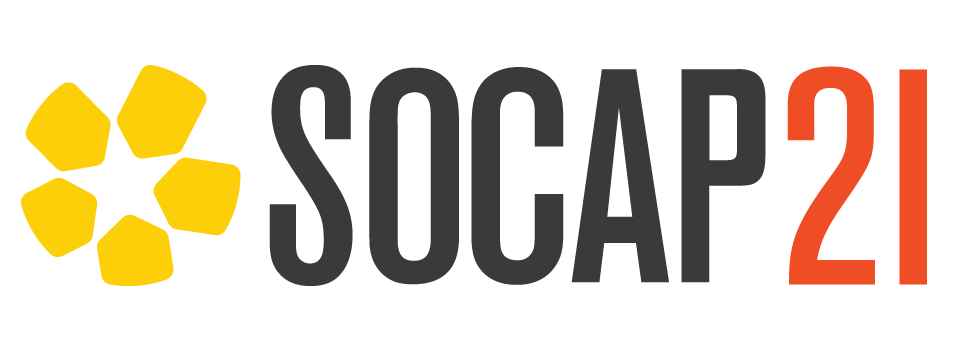
SOCAP21
How to Have Real Conversations About Race Within Purpose-Driven Organizations
Mission-driven organizations are increasingly turning their external focus and efforts to issues of racism and inequality. However, these same organizations are often reluctant to ask tough questions about race within their own organizations. During this session, hear from the board chairs and C-suite leaders of Southern Bancorp, a leading CDFI operating in the Southern U.S., about their journey moving beyond their comfort zones to real conversations about race. This team discusses how to not only create impact within our communities, but within our organizations as well.
Watch the session to hear from Laurie Spengler, President & CEO of Courageous Capital Advisors, LLC; Glen Jones, Chair of the Board of Southern Bancorp, Inc.; Darrin Williams, CEO of Southern Bancorp, Inc.; Donna Gambrell, President and CEO of Appalachian Community Capital; John Olaimey, President and CEO of Southern Bancorp; and Andrea Parnell, Chief People Officer of Southern Bancorp
The Business of Building a Better World: ‘Hope Is a Verb with Its Sleeves Rolled Up’
Times of disruption can forge new perspectives. For leaders in the impact economy, the current global divisions, societal reckonings, and climate crisis present an opportunity to unlock the power of markets to accelerate greater good. As impact investing becomes mainstream, the decade ahead will be a critical time to realize such great change through collaboration and community.
Watch the session to hear from David Cooperrider, Distinguished University Professor at Case Western Reserve University; Audrey Selian, Director at Artha Impact (Rianta Capital Zurich); Dr. Gillian Marcelle, Managing Member at Resilience Capital Ventures, LLC; John Elkington, Author & Entrepreneur; and Raj Sisodia, Distinguished University Professor of Conscious Enterprise and Chairman, Conscious Enterprise Center at Tecnologico de Monterrey
“Economies are the most dynamic when they have a mission.”
— David Cooperrider
Busting Myths About the ‘S’ Dimension in ESG: What’s Needed for Broad and Impactful Integration
The global spotlight on racial injustices and social inequities heightened by the COVID-19 pandemic has accelerated investor and consumer interest in a company’s social impact. But the middle value in “ESG” — social impact — is seen by some as more challenging to define and measure than environmental or governance factors. In this session, leaders in the human rights and investment spaces discuss the importance of increased awareness of social impact in tackling global inequities and building a more inclusive and sustainable economy, as well as ways to better determine and measure that impact.
This session includes Carolina Henriquez-Schmitz, Director, TrustLaw at Thomson Reuters Foundation; James Andrus, Investment Manager at CalPERS; Bennett Freeman, Principal at Bennett Freeman Associates LLC; Carolien de Bruin, Head of COVID Response Alliance for Social Entrepreneurs at World Economic Forum; and Michael Schreiber, COO at RFK Human Rights
Latinx Launchpad—Latinas Who Lead: A Pitch Competition Hosted by Hispanics in Philanthropy
While the percentage of investment they receive remains low, social entrepreneurs who are Black, Indigenous, and People of Color — with products that typically serve often-overlooked populations — are gaining traction with impact investors looking to bridge the capital gap and power a more inclusive economy.
During “Latinx Launchpad—Latinas Who Lead: A Pitch Competition Hosted by Hispanics in Philanthropy,” seven Latina founders explain their startup concepts and join a Q&A with an expert panel. While Latina founders receive less than 0.4% of venture capital investments, organizations like Hispanics in Philanthropy (HIP) have been working to build social justice and shared prosperity for the Latinx community. Jorge Calderon, Managing Director of Impact Investments at HIP and moderator of the session, said the Latinx Launchpad is one of three programs the organization uses to decrease the wealth gap by increasing participation in the startup economy.
Behavior Change Design for Sustainable Development
The Sustainable Development Goals, and the organizations addressing them, are asking individuals, businesses, and governments to change their behaviors. Understanding human behavior and defining behavioral challenges and barriers is therefore essential to building successful products and services aimed at advancing achievement of SDGs. This session highlights the basics of designing for behavior change, sharing practical skills that can be applied to improve the impact of their programs, services, or fundraising initiatives. Watch this session to hear from Olga Elizarova, Founder and Behavior Change Designer at Play Collaborate Change; and Dustin DiTommaso, SVP Behavior Change Design at Mad*Pow.
From Farmers to Sovereign Governments: Emerging Fintech Is Addressing the $162B Protection Gap
Insurance, like many financial products and services, has thus far only benefited a few — even though it’s a key mechanism by which humans prepare for risk. The global underinsurance, or “Protection Gap’” is U.S.$162.5B, of which emerging economies account for 96%. Digital insurance and microinsurance are now proliferating and aiming to serve millions. How do these new products work and what is the role of emerging technologies in filling this need? This session features both entrepreneurs and investors working toward the next generation of insurance and resilience. Panelists are: Rose Goslinga, Cofounder and Co-CEO at Pula Advisors; Timothy Rann, Managing Partner at Mercy Corps Ventures; Anuj Kumbhat, Co-founder & CEO at Weather Risk Management Services (WRMS); and Bessie Schwarz, Co-Founder & CEO at Cloud to Street.
What Makes a Healthcare Investor an Impact Investor?
The pandemic pushed healthcare systems past the breaking point. And reliable, consistent healthcare is out of reach for far too many. Impact investors have been eager to find and support businesses that can fix these broken systems. But healthcare is rife with investments that wouldn’t pass the impact sniff test. So what makes a healthcare investor an impact investor? Using concrete examples, these panelists share how to make this critically important distinction. Watch this session to hear from Marieke Spence, Executive Director of Impact Capital Managers (ICM); James Olsen, Founder and Managing Partner of Concord Health Partners; Roger Liew, Partner at Impact Engine; Jenny Yip, Managing Partner at Adjuvant Capital.
Inclusivity in Supply Chains Post-COVID — and How Impact Investing Fits In
While the climate change debate rages on in the political sphere, the private sector has largely recognized the importance of sustainability and climate change mitigation and adaptation for the future of their supply chains and business. But, what does sustainability really mean when so many of the people who produce our goods live in poverty, when natural resources are not managed sustainably, and working conditions are poor? Whether smallholder farmers produce a third of the world’s food, as recent studies suggest, or more, there is no debating their importance for local economies and sustainable development. We can’t afford to leave them out. So, how do we support them to reclaim sustainability; from achieving inclusivity to producing in balance with nature, to receiving a fair share of the value in the supply chain? How can impact investment work for smallholder farmers and workers?
Watch this session to hear from stakeholders from along the supply chain as they engage in a thought-provoking dialogue on achieving true sustainability. Panelists are: Issifu Issaka, President of Sefwi Bekwai District Cocoa Farmers Cooperative Union Ghana; Anne Park, Global Director of Impact at Small Enterprise Assistance Funds (SEAF); Yasmina Zaidman, Chief Partnerships Officer at Acumen; and Madhyama Subramanian, Head of Programs and Partnerships at Solidaridad North America.
“The ‘E’ and ‘G’ part are much better understood … the ‘S’ is the real mystery. What does it mean to have something that is really having a social impact or mitigating harmful effects from a social perspective?”
— Yasmina Zaidman
Reimagining and Revolutionizing Investment Through Rematriation
In this session, we learn about the first-ever Matriarch Revolutionary Fund, which will help growth-ready Indigenous womxn-owned businesses access equitable capital. This fund will use character-based lending principles the fund’s developerd created — the 5 R’s of Rematriation — instead of the 5 C’s of Credit used to address traditional risk concerns. During this session, panelists discuss challenges faced and lessons learned from designing a fund (and raising capital) that puts the risk on those with the most instead of those with the least. Watch the session to hear from Vanessa Roanhorse, CEO of Roanhorse Consulting, LLC; Lauren Ruffin, Co-founder & CEO of CRUX; Lucas Turner-Owens, Founding Partner of The Sankofa Group; Agnetha Jaime Gloshay, Co-Director of Native Women Lead; and Eric Horvath, Partner of The Sankofa Group.
Financing Climate Justice
In this session, we hear from leading financial intermediaries who are paving the way for climate justice as they discuss the importance and potential impact of green banks; the promise of these emerging institutions working in partnership with community lenders; ways to dramatically increase the scale of capital focused on clean energy and energy efficiency for low- and moderate-income communities and communities of color; and the potential of solar deployment with an explicit focus on social equity. Panelists are Doug Sims, Senior Director, Resilient Communities Division, People & Communities Program at Natural Resources Defense Council; Omar Blayton, CFO at Sunwealth Power, Inc.; Kerry O’Neill, CEO at Inclusive Prosperity Capital; and Cathie Mahon, President & CEO at Inclusiv.
Inclusive Wealth Creation: Reimagining Real Estate to Profit Renters, Communities, and Investors
Unlike “qualified” investors, most low- and moderate-income people are shut out from the profits of real estate built in their neighborhoods. Why does the model exclude so many while enriching so few? This session explores more inclusive real estate investment models. Renters can profit from apartment buildings where they live. Communities can earn from places where they shop. And impact investors can create a new frontier of wealth creation for generations to come. Watch the session to hear from Chris Herrmann, Senior Vice President at Enterprise Community Investment, Inc.; Kimberlee Cornett, Director, Impact Investments at Robert Wood Johnson Foundation; Roy Swan, Director, Mission Investments at The Ford Foundation; and John W. Haines, Executive Director, Community Investment Trust at Mercy Corps.
Power, Risk, and Justice: A Model for Investors to Advance Racial Equity
Centuries of systemic racism have led to deep economic inequities, and investors increasingly recognize the need to advance racial equity through their practices and portfolios. In this discussion the PolicyLink, CapEQ, and GIIN teams share a powerful model for how investors can and must reconsider their decision-making power, their perceptions of risk, and how to promote equitable outcomes in their work.
Panelists are Mahlet Getachew, Managing Director, Corporate Racial Equity at PolicyLink; Tynesia Boyea-Robinson, President and CEO at CapEQ; Amit Bouri, Co-Founder + CEO at GIIN; Nick Jean-Baptiste, Founder and Managing Partner at Jacmel Growth Partners; Catherine Burnett, Chief Impact Officer at Phillips Foundation; and JaNay Queen Nazaire, Senior Advisor at PSG Equity.
Forging an Inclusive Economy: The Role of Business
While capitalism has created prosperity for some, it also has left many people behind. That prompted EY to partner with Acumen and create an inclusive business playbook designed to equip businesses of all sizes with a framework and inspiration to better serve the needs of low-income and marginalized communities.
One example of this is Tony’s Chocolonely, a chocolate bar company that promotes dignity and fairness for cocoa growers. Henk Jan Beltman, Chief Chocolate Officer at Tony’s Chocolonely, in conversation with Gillian Hinde, Global Corporate Responsibility Leader at EY, shares how the company is reshaping supply chains to make slave-free chocolate the industry norm.
20 Years of Patient Capital … And Where It Goes From Here
“This is a time where we all have to step back and reimagine our systems to move profit from the center of everything and insist on putting our shared humanity and the sustainability of the Earth there. It’s also a time for each of us to step back and ask: What more can we ourselves do?” — Jacqueline Novogratz, Founder & CEO of Acumen.
For the last two decades, Acumen has used philanthropic capital and leveraged the power of markets to solve problems of poverty. When Acumen began in 2001, the term “impact investing” did not yet exist; now it is part of the capital firmament. Acumen has evolved as well over that time — and the organization’s approach is now less novel, but no less urgent. In this session that combines data, reflections, and anecdotes from Acumen’s past, Jacqueline highlights how patient capital has enabled impact to thrive, where Acumen and others have fallen short and what we can learn from those moments, and Acumen’s vision for the future of patient capital over its next 20 years.
State of the Field and Practice of Impact Investing
As ongoing crises continue to underscore the limitations of our institutions, impact investing is gaining traction in the mainstream as a potential path forward in building an economy that works for all. During this annual session, panelists reflect on developments and innovations in the field over the past year, as well as how impact investing should be situated within societal conversations, such as the post-pandemic “new normal,” stakeholder accountability, dismantling systemic racism, and beyond. Watch this session to hear from Fran Seegull, President of U.S. Impact Investing Alliance; Monique Aiken, Managing Director at The Investment Integration Project (TIIP); Cathy Clark, Faculty Director at Duke University
“(We must) understand that risk is perception, and it’s cultural. What we say is ‘risky’ exposes our own indoctrination to the norms. … We need to think about who is risky, who is labeled risky.”
— Monique Aiken
INTEGRATE21
The State of SEC Policy and Mandates
At the INTEGRATE21 conference, Robert Jackson, Former Commissioner of the Securities and Exchange Commission, provided on-the-ground details and information about the latest changes on climate change declaration and other coming changes and requirements at the SEC.
Additional Resources We Created in 2021:
- Impact Investing Guide | This new online resource provides an overview of impact investing — from background knowledge to where and how to start aligning your investments, no matter how small or large, with your values. Find innovative examples across sectors and asset classes sourced from the SOCAP community and network, along with tools and resources to help you get started or to keep going deeper. Explore the resource here.
- SOCAP Assembly | Connect with others in the impact movement year-round in our free online platform, SOCAP Assembly. This platform is a great place to ask questions, post resources, and find your next action collaborators. Join for free here.
- SOCAP21 Playlist | During SOCAP21, we asked the SOCAP community to share songs that help them keep doing the work. Listen to the community-sourced playlist here!
Stay Connected!
- Join us for an event | Check out our events page for information about upcoming SOCAP events.
- Subscribe to our newsletter | Our newsletter is built for everyone working at the intersection of money and meaning. Sign up here to get the next one delivered to your inbox!
- Connect with us on social media | Follow us on social media to see the latest SOCAP content and more! We’re on LinkedIn, Twitter, Instagram, Facebook, and YouTube.
